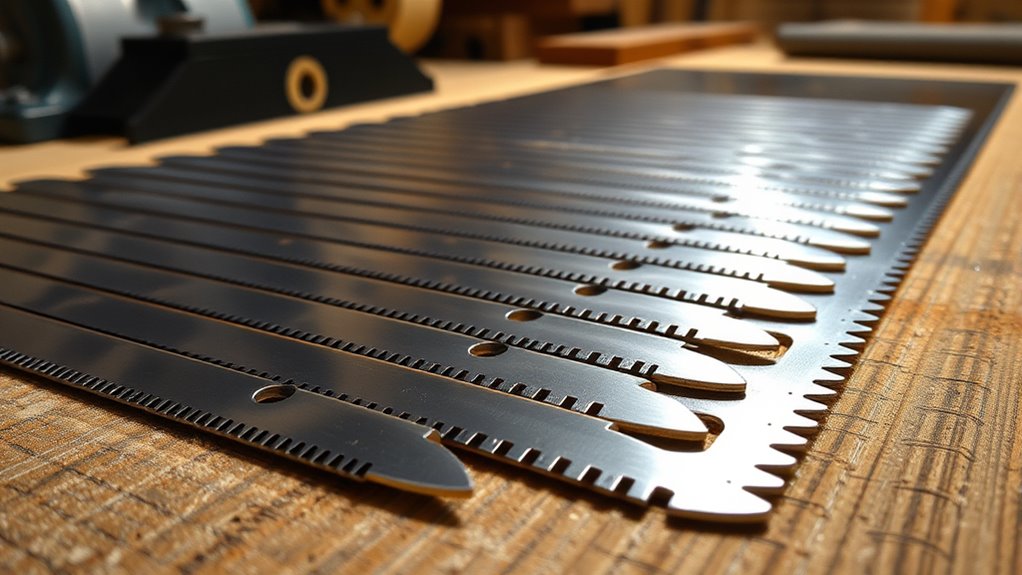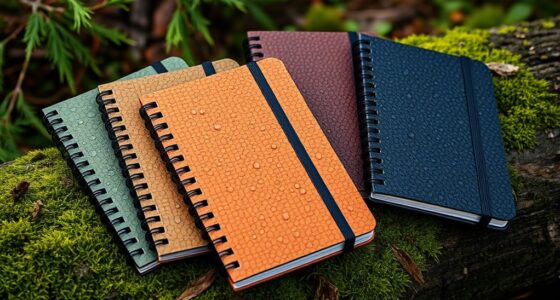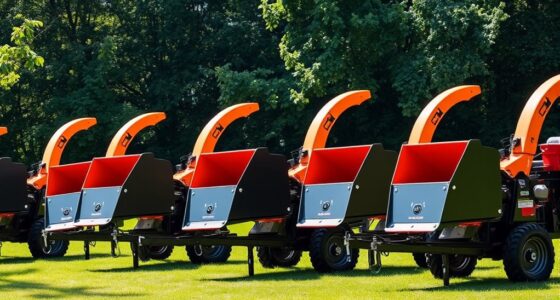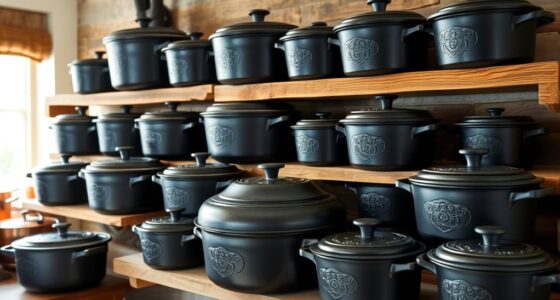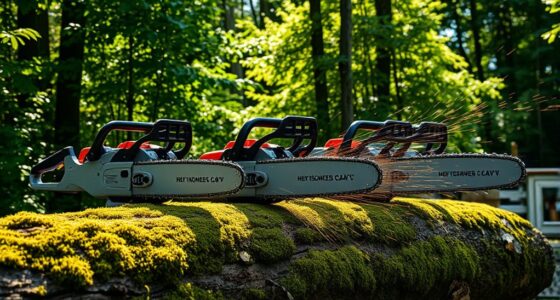If you’re exploring the 15 best bandsaw blades for hardwood milling in 2025, I recommend looking at blades like Timber Wolf’s 99 3/4 x 1/8 and 1/2 x 93-1/2, known for sharpness and durability. Other excellent options include Wood-Mizer’s 144 blades and FOXBC’s 44-7/8-inch blades, offering a mix of high performance and long lifespan. Understanding these choices can help you match the right blade to your projects, so stick around to learn more.
Key Takeaways
- Prioritize blades made from high-quality bi-metal or alloy steels for durability and heat resistance during hardwood milling.
- Select blade types and tooth configurations—such as hook or raker teeth—that optimize cutting speed and finish in dense hardwoods.
- Consider kerf width to balance material conservation with blade stability and cut precision.
- Ensure compatibility with your sawmill or portable bandsaw model for optimal performance and safety.
- Opt for blades with proven longevity, resharpenability, and suitable dimensions for heavy-duty and fine woodworking applications.
Timber Wolf 99 3/4 x 1/8 Band Saw Blade
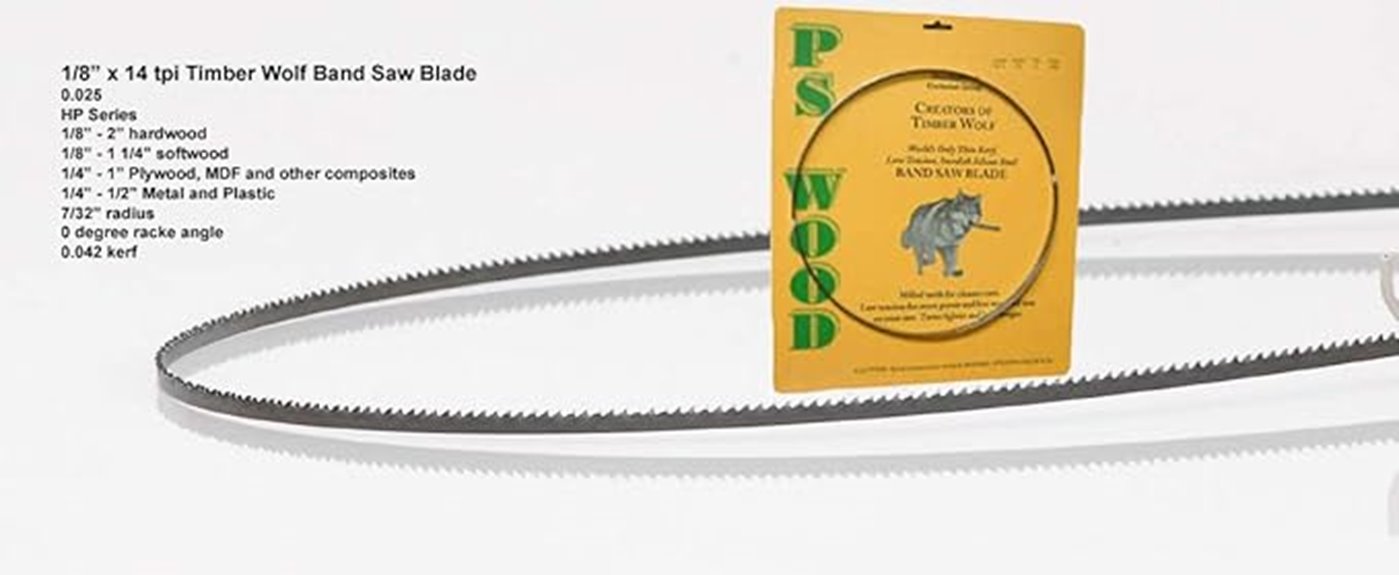
Are you looking for a bandsaw blade that delivers precise, clean cuts in hardwoods and delicate materials? The Timber Wolf 99 3/4 x 1/8 Band Saw Blade is designed for high performance. Made with premium Swedish steels, it features razor-sharp milling teeth that cut smoothly without stamping or grinding. Its proprietary induction hardening guarantees uniform hardness, making the teeth 20% harder than high carbon steel. The blade’s thin kerf and true tracking provide accurate, detailed cuts in kiln-dried wood, plywood, and even soft metals. At 99.75 inches long, it’s perfect for fine woodworking and delicate projects requiring precision and clean finishes.
Best For: woodworkers and hobbyists seeking precise, clean cuts in hardwoods, soft metals, and delicate materials for detailed projects.
Pros:
- Razor-sharp milling teeth for smooth, accurate cuts without tearing or rough edges
- Uniform induction-hardened teeth that stay sharp longer, ideal for fine woodworking
- True tracking and thin kerf design ensure precise, consistent cuts in various materials
Cons:
- Some users report rapid dulling or breakage with heavy or improper use
- Slight variability in longevity depending on usage and batch quality
- Higher price point compared to stamped or crush-ground blades
Timber Wolf Bandsaw Blade 1/2 X 93-1/2, 3 Tpi – Positive Claw

If you’re looking for a bandsaw blade that excels at resawing thick hardwoods with precision and speed, the Timber Wolf 1/2 X 93-1/2, 3 TPI – Positive Claw is an excellent choice. Made from high silicon, low carbide steel, it runs cooler, lasts longer, and requires less horsepower thanks to its thin kerf (.025 inches) and low tension design. Its unique round gullet and 6.5° rake set pattern deliver smooth, accurate cuts through dense woods like pecan and hickory. While some users report issues like bending or wobbling, overall, this blade offers durability, fast cutting, and excellent performance for both hobbyists and pros.
Best For: woodworkers, hobbyists, and professionals seeking precise, efficient resawing of thick hardwoods like pecan and hickory with minimal wear and smooth cuts.
Pros:
- Outlasts carbon steel blades with better durability and longer life
- Thin kerf (.025 inches) reduces material waste and requires less horsepower
- Excellent at resawing thick or dense woods with smooth, accurate cuts
Cons:
- Some users experience blades arriving bent or wobbling during use
- Higher cost compared to traditional carbon steel blades
- Occasional issues with blade snapping under heavy or extended use
27 Inch Bandsaw Blades, 24 TPI, for DeWalt DCS377 & Milwaukee Portable Band Saw, 3-Pack

These 27-inch bandsaw blades with 24 TPI are ideal for professionals and serious DIYers who need precise, clean cuts in hardwoods. Made from durable Bi-Metal M42 High-Speed Steel, they withstand heat and stay sharp longer. The hook teeth profile ensures smooth, accurate cuts, perfect for detailed woodworking. Compatible with DeWalt DCS377 and Milwaukee portable band saws, each pack includes three blades, offering great value. Whether you’re shaping intricate designs or slicing tough hardwoods, these blades deliver consistent performance. Their size and design make them versatile, reliable tools for achieving high-quality results in demanding projects.
Best For: DIYers and professionals needing precise, high-quality cuts in hardwoods and intricate shapes using portable bandsaws.
Pros:
- Made from durable Bi-Metal M42 High-Speed Steel for heat resistance and longevity
- Sharp, precision-sharpened teeth for clean, accurate cuts
- Compatible with multiple popular portable bandsaw models, offering versatility
Cons:
- Only suited for specific band saw brands and models, limiting universal compatibility
- 24 TPI may not be ideal for very coarse or very fine cutting needs
- The 0.020-inch thickness might be less durable for very heavy-duty or aggressive cutting applications
FOXBC 27 Inch Bandsaw Blades 18 TPI for DeWalt DCS377 and Milwaukee 48-39-0572, 3 Pack

Looking for a reliable set of bandsaw blades that can handle small metal cutting tasks with precision? The FOXBC 27-inch, 18 TPI blades are a great choice. Designed for DeWalt DCS377 and Milwaukee 48-39-0572 saws, they cut materials ranging from 5/32 to 3/16 inches thick, even harder metals up to 5/16 inches. Made from premium Bi-Metal M42 High-Speed Steel, they offer heat resistance and durability. The sharp, hook-shaped teeth ensure clean, precise cuts on steel conduit, copper, and angle iron. Packaged with three blades, they provide excellent value for DIYers and professionals alike, balancing affordability with reliable performance.
Best For: DIY enthusiasts and professionals seeking reliable, precise metal cutting blades for portable bandsaws like DeWalt DCS377 and Milwaukee 48-39-0572.
Pros:
- Made from premium Bi-Metal M42 High-Speed Steel for heat resistance and durability.
- Sharp, hook-shaped teeth provide clean, precise cuts on various metals.
- Packaged with three blades offering excellent value and versatility for multiple projects.
Cons:
- Some users report teeth loosening or breaking when cutting harder materials like rebar.
- May not fit all saw models, such as certain Dewalt 3-3/8” bandsaws.
- Durability can vary; blades might wear out faster on tough, hardened metals.
Wood-Mizer 144 Sawmill Bandsaw Blades 5-Pack
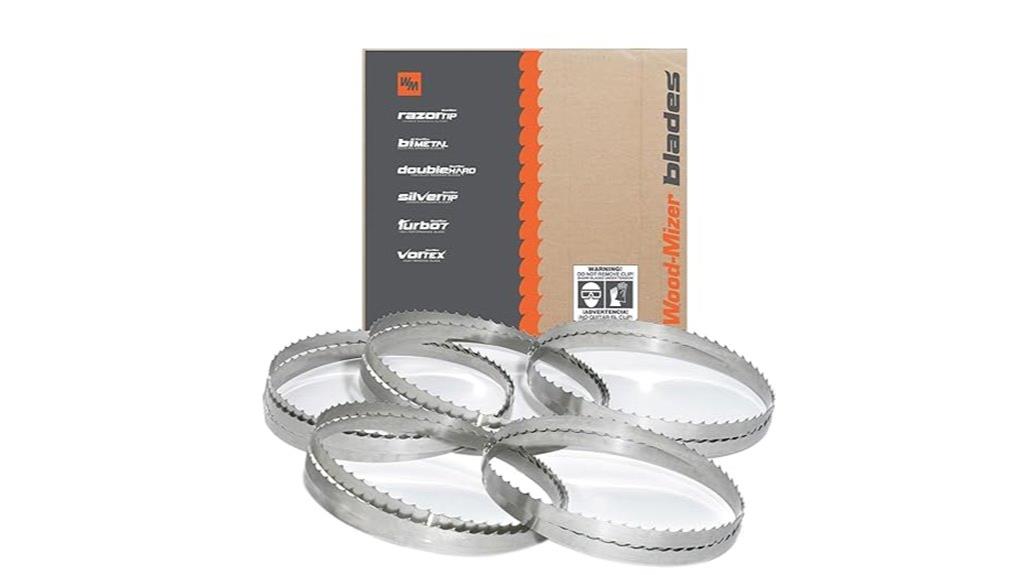
The Wood-Mizer 144 Sawmill Bandsaw Blades 5-Pack stands out as an excellent choice for those seeking durable, high-performance blades for hardwood milling. Made of DoubleHard high-alloy steel, these blades last twice as long and stay sharper longer than standard options. They feature a 10° hook angle, ideal for cutting mixed wood species, and are easy to install with a perfect fit on various portable sawmills like Timber Tuff and Norwood. The blades cut smoothly and are resharpenable with CBN grinding wheels, offering great value. Overall, this 5-pack provides reliable, heavy-duty performance at a cost-effective price, making it a smart investment for demanding hardwood projects.
Best For: DIY enthusiasts and professional woodworkers seeking long-lasting, high-performance blades for hardwood milling on portable sawmills.
Pros:
- Made of DoubleHard high-alloy steel for twice the lifespan and sharpness retention
- Easy to install with a perfect fit on various portable sawmills
- Resharpenable with CBN grinding wheels, offering cost-effective durability
Cons:
- Initial slow cutting may occur after processing about 1.5 logs
- Occasional groove marks on lumber, possibly due to teeth setting
- Slightly higher cost compared to standard or factory blades
Wood-Mizer 158 Sawmill Bandsaw Blades 5-Pack

For those seeking reliable blades that deliver fast, straight cuts on portable sawmills and band resaws, the Wood-Mizer 158 Sawmill Bandsaw Blades 5-Pack stands out as an excellent choice. These blades are made from DoubleHard high-alloy steel, doubling their sharpness lifespan compared to standard carbon steel. With a 10° all-purpose hook angle, they handle mixed wood species effectively. The blades are 0.045” thick, 1-1/4” wide, and feature 7/8” tooth spacing, making them versatile for various cutting tasks. Users praise their initial sharpness, ease of installation, and ability to cut everything from small pine to large logs, though longevity varies.
Best For: DIY woodworkers and professional operators seeking sharp, versatile bandsaw blades for portable sawmills and band resaws handling various wood species.
Pros:
- Made from DoubleHard high-alloy steel for extended sharpness and durability
- Sharp initial cutting performance with easy installation and maintenance
- Versatile 10° hook angle suitable for mixed wood cutting
Cons:
- Longevity varies; some blades may break after short use
- Durability over time is inconsistent, requiring ongoing testing
- Some users report blades last about a year, while others experience shorter lifespan
Timber Wolf Bandsaw Blade 3/4 X 131.5, 2-3 TPI
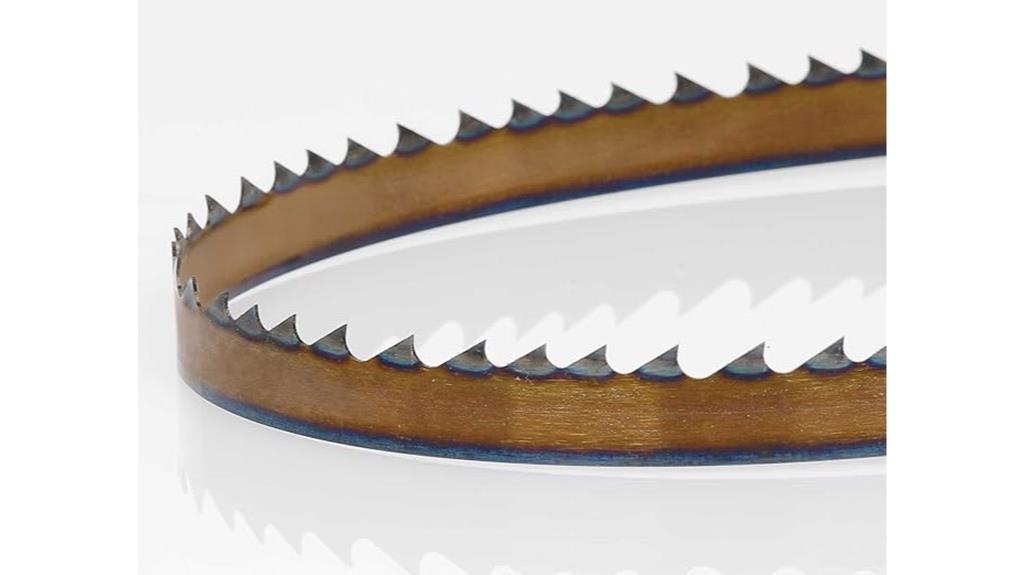
If you’re cutting hardwoods, the Timber Wolf Bandsaw Blade 3/4 x 131.5 inches with 2-3 TPI stands out due to its advanced tooth design and durability. Its milled teeth are 50% sharper than stamped or crush ground blades, ensuring cleaner cuts. The tooth edge is 20% harder than high carbon steel, which boosts longevity and maintains sharpness longer. Manufactured with precision induction hardening, it offers consistent hardness throughout. Made from ductile steel, it flexes less and runs cooler, reducing heat buildup. Overall, this blade delivers improved cutting efficiency, extended lifespan, and reliable performance for demanding hardwood milling tasks.
Best For: woodworkers and professionals cutting hardwoods who need a durable, sharp, and reliable bandsaw blade for demanding applications.
Pros:
- Milled teeth are 50% sharper than stamped or crush ground blades, providing cleaner cuts
- Tooth edge is 20% harder than high carbon steel, increasing blade lifespan and maintaining sharpness
- Precision induction hardening ensures consistent hardness and reliability throughout the blade
Cons:
- The 2-3 TPI may produce rougher cuts on finer work requiring a smoother finish
- Higher manufacturing costs could result in a higher price point compared to standard blades
- Ductile steel, while durable, may be less stiff than other materials, potentially affecting precision in very fine cuts
Timber Wolf 70 1/2 x 1/2 x 4 tpi Band Saw Blade
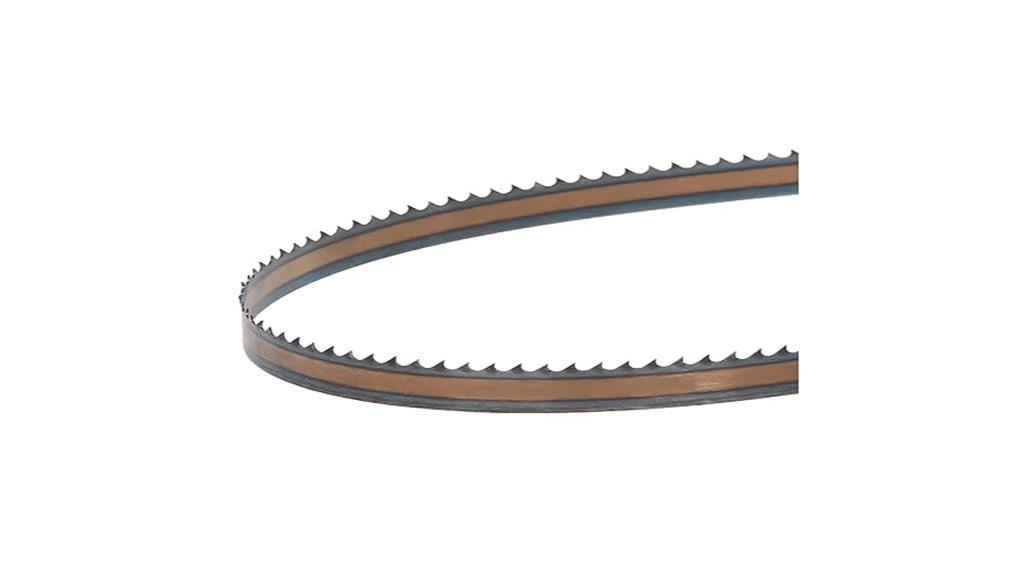
When precision and smooth cuts matter most in hardwood milling, the Timber Wolf 70 1/2 x 1/2 x 4 TPI band saw blade stands out as an excellent choice. Made from Swedish Silicon Steel with induction-hardened teeth, it offers a thin kerf that produces less waste and runs cooler for longer-lasting performance. Its combination hook/skip design handles straight cuts and resawing in hardwoods like black walnut and mahogany, delivering smooth, accurate results. Easy to install and track true, this blade provides control and durability, making it perfect for both professional and hobbyist woodworking projects.
Best For: woodworkers and hobbyists who require precise, smooth cuts and durable performance when working with hardwoods and softwoods.
Pros:
- Produces smooth, straight cuts with excellent control and tracking
- Made from durable Swedish Silicon Steel with induction-hardened teeth for long-lasting use
- Thin kerf reduces material waste and runs cooler, extending blade life
Cons:
- Can be louder during operation compared to thicker blades
- Proper tensioning and setup are necessary for optimal performance
- Handling during unboxing requires caution due to sharpness
Wood-Mizer 125 Sawmill Bandsaw Blades 5-Pack

The Wood-Mizer 125 Sawmill Bandsaw Blades 5-Pack stands out as an excellent choice for sawmill operators and serious woodworkers seeking reliable, all-purpose blades. These DoubleHard 10° blades are designed for versatile woodworking, especially for sawmills like the Woodland Mills HM122. Users report they last longer, stay sharper, and deliver clean, straight cuts, often making about four large logs from a single blade. Many customers are satisfied with their quality and value, though some have experienced blades breaking at the welds. Overall, they’re a solid option for durable, efficient sawing, especially when cutting hardwoods.
Best For: serious woodworkers and sawmill operators seeking durable, all-purpose bandsaw blades for efficient and clean cutting of various wood types.
Pros:
- Lasts longer and maintains sharpness better than many competing brands
- Provides clean, straight cuts suitable for sawmills and woodworking projects
- Offers good value with high customer satisfaction and repeat purchases
Cons:
- Some blades may break at the welds, leading to early replacement
- Performance can vary depending on wood type, with shorter lifespan in softer woods
- Occasional issues with order accuracy and inventory control affecting delivery
Wood-Mizer 132 Sawmill Bandsaw Blades 5-Pack
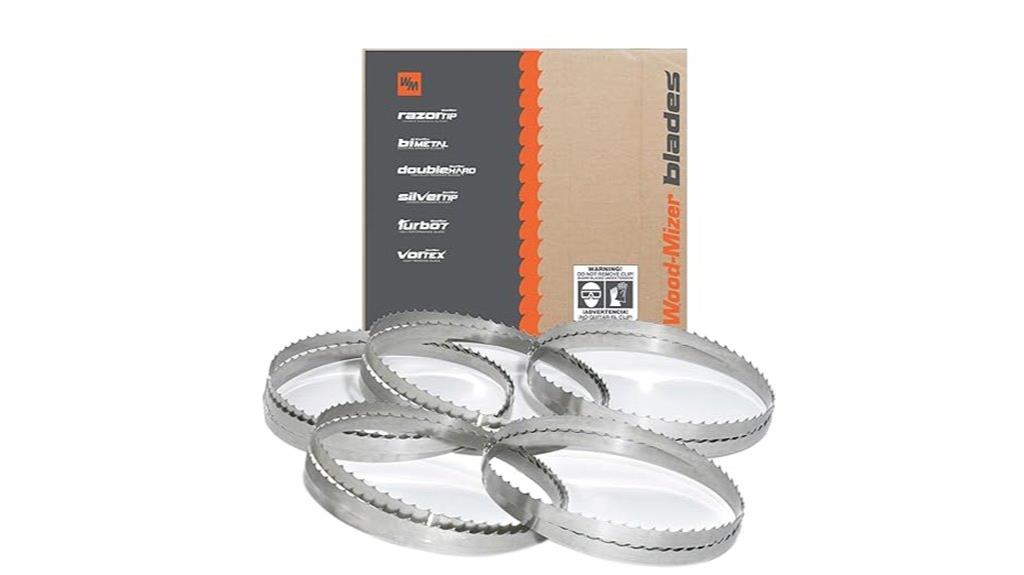
For those seeking durable, all-purpose bandsaw blades, the Wood-Mizer 132 Sawmill Bandsaw Blades 5-Pack stands out with its 10° hook angle, designed to deliver ideal cutting performance across various wood types. Made from DoubleHard high-alloy steel, these blades last twice as long as standard carbon steel options. They’re resharpenable with a CBN grinding wheel, allowing extended use. With dimensions of 0.042” thick and 1-1/4” wide, and tooth spacing of 7/8”, they’re versatile enough for softwoods, medium hardwoods, and hardwoods. Compatible with select portable sawmills from different brands, these blades are perfect for those needing reliable, all-around performance.
Best For: woodworkers, sawmill operators, and DIY enthusiasts seeking durable, versatile bandsaw blades for all-purpose sawing across various wood types.
Pros:
- Made from DoubleHard high-alloy steel for extended blade life
- Resharpenable with a CBN grinding wheel, enhancing longevity
- Compatible with multiple brands of portable sawmills for versatile use
Cons:
- May require specific sharpening equipment (CBN grinding wheel)
- Dimensions and tooth spacing may not suit all specialized cutting needs
- Not specified if blades are suitable for very hard or exotic woods
44-7/8 Inch Bandsaw Blades 10/14 TPI for Milwaukee and DeWalt (3-Pack)

This 3-pack of 7/8 inch bandsaw blades with 10/14 TPI is perfect for professionals and DIY enthusiasts who need reliable, high-performance blades compatible with Milwaukee and DeWalt portable bandsaws. Made from durable Bi-Metal M42 High-Speed Steel, these blades resist heat and guarantee long-lasting cuts. They fit a wide range of models, including Milwaukee M18 FUEL, DeWalt, Bosch, Makita, and more. Designed for smooth, precise cuts through materials up to 5/16 inches thick, they deliver consistent performance even during heavy-duty tasks. Plus, the package includes a pair of gloves, adding safety and convenience for ongoing projects.
Best For: DIY enthusiasts and professionals seeking reliable, high-performance bandsaw blades compatible with Milwaukee, DeWalt, and other portable bandsaws for cutting materials up to 5/16 inches thick.
Pros:
- Made from durable Bi-Metal M42 High-Speed Steel for heat resistance and long-lasting performance
- Universal fit for a wide range of portable bandsaw models including Milwaukee, DeWalt, Bosch, and Makita
- Comes with a pair of gloves, enhancing safety and convenience during use
Cons:
- May be overkill for very light or infrequent cutting tasks
- The package contains only three blades, which might require additional purchases for extensive projects
- Compatibility relies on correct blade dimensions; not suitable for non-standard or larger bandsaw models
FOXBC Bandsaw Blades 44-7/8 Inch (3-Pack)

If you’re looking for reliable blades to handle hardwood milling, FOXBC Bandsaw Blades 44-7/8 Inch (3-Pack) stand out as a practical choice. These blades are 1/2 inch wide, 0.020 inch thick, with 10/14 TPI, designed for portable band saws like Milwaukee, Bosch, Dewalt, and Makita. Made from durable bi-metal M42 high-speed steel, they cut through steel, aluminum, and galvanized steel quickly and cleanly. Users appreciate their long-lasting performance and good fit on various saws. While some find they flex under heavy load, overall, these blades offer excellent value for quick, efficient cuts in a range of materials.
Best For: DIYers and fabricators seeking reliable, cost-effective blades for quick cuts on steel, aluminum, and galvanized steel with portable band saws.
Pros:
- Made from durable bi-metal M42 high-speed steel for long-lasting performance
- Compatible with popular portable band saws like Milwaukee, Bosch, Dewalt, and Makita
- Provides fast, clean cuts suitable for mild steel, aluminum, and galvanized steel
Cons:
- Some users report blades flex under heavy load, causing crooked cuts
- Not as durable on harder steels compared to American-made brands like MK Morse or Lenox
- May dull quickly when cutting tougher or harder materials, reducing lifespan
FOXBC 44-7/8-inch Bandsaw Blades 18 TPI, 3-Pack
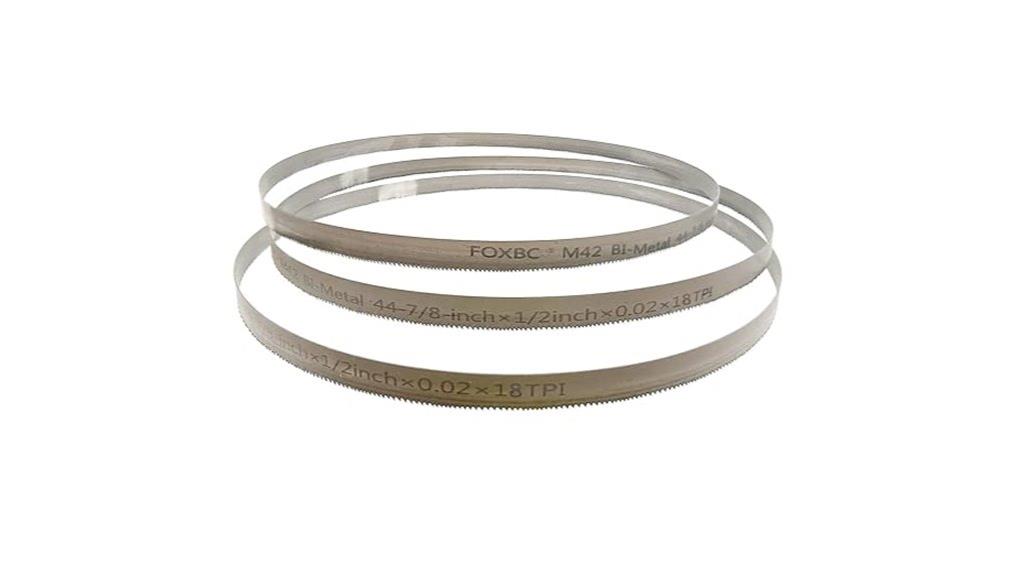
The FOXBC 44-7/8-inch bandsaw blades with 18 TPI are an excellent choice for those tackling hardwood milling projects. Made from premium bi-metal steel, they’re heat resistant and durable, designed for extended use. The 18 TPI provides a good balance for fast, clean cuts through dense hardwoods. These blades fit most 44-7/8-inch saws, including popular models from Milwaukee, DeWalt, Bosch, and Makita. Users praise their sharpness and affordability, especially when used at slower speeds. While some fitment issues on specific saws exist, overall, these blades offer reliable performance and excellent value for heavy-duty woodworking tasks.
Best For: DIY enthusiasts and professionals needing reliable, cost-effective blades for heavy-duty cutting of hardwoods and steel with 44-7/8-inch band saws.
Pros:
- Made from premium bi-metal high-speed steel for durability and heat resistance
- Provides fast, clean cuts suitable for dense hardwoods and steel pipes
- Compatible with a wide range of popular band saw brands and models
Cons:
- May have fitment issues on certain saws, especially some Milwaukee models
- Some users find it challenging to fit on specific saws without adjustment
- Not ideal for cutting stainless steel at high speeds, as some users report less effective performance
FOXBC 27 Inch Bandsaw Blades (3 Pack)
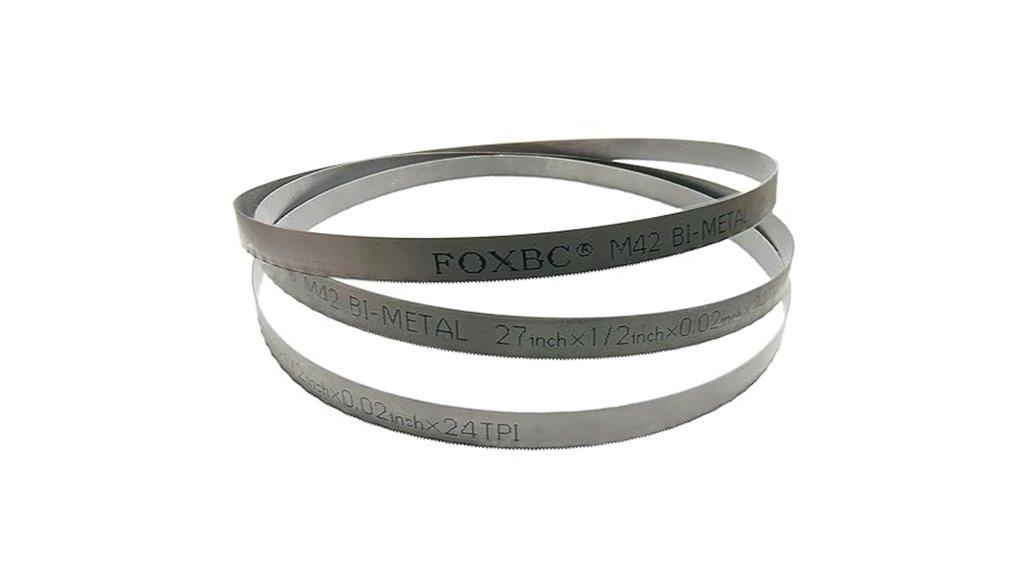
For those seeking reliable blades for hardwood milling, the FOXBC 27 Inch Bandsaw Blades (3 Pack) stand out with their premium bi-metal construction and hook-shaped teeth. These blades are 1/2 inch wide, 0.020 inch thick, and feature 24 TPI, making them compatible with popular Milwaukee and DeWalt models. Made from high-speed steel, they offer excellent heat resistance and durability. The precision-sharpened teeth ensure smooth, accurate cuts on various materials, including electrical components and metals. Users appreciate their longevity and performance, especially in light to moderate tasks. While some report early wear on tough materials, overall, these blades provide great value for versatile woodworking needs.
Best For: DIY enthusiasts and professionals seeking affordable, reliable bandsaw blades for light to moderate woodworking and metal-cutting tasks.
Pros:
- Made from premium bi-metal M42 High-Speed Steel for durability and heat resistance
- Precision-sharpened teeth provide smooth, accurate cuts on various materials
- Compatible with popular Milwaukee and DeWalt models, offering versatile use
Cons:
- May experience early wear or cracking when cutting tough or heavy-duty materials
- Some users report quick blade failure when cutting EMT conduit or uni-strut
- Not ideal for heavy-duty or specialized industrial applications
Bandsaw Blade 3/8 x 111, 3 TPI
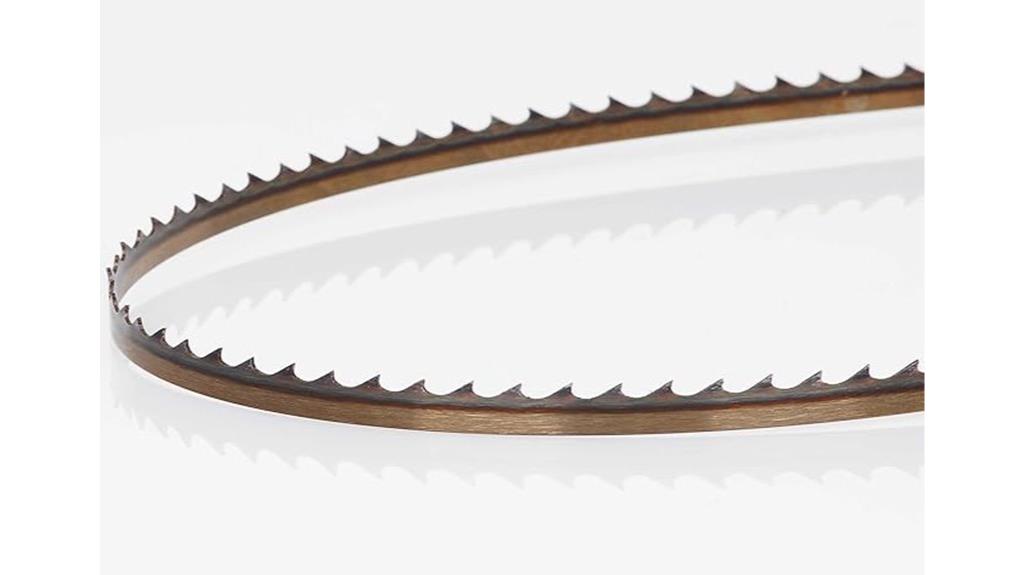
Looking for a reliable bandsaw blade that can handle tough hardwood milling projects? The Timber Wolf 3/8 x 111, 3 TPI blade is an excellent choice. It’s designed for woodworking, milling, and carving, especially on green hardwoods like cherry and walnut. Made from premium Swedish steel with proprietary induction hardening, it offers razor-sharp teeth and lasting durability. Its 3 TPI configuration makes it perfect for roughing out thick blanks and working on burls or logs. While not compatible with three-wheel saws or smaller machines, it excels on larger saws, delivering precise cuts and long-lasting performance.
Best For: woodworkers and wood-carvers tackling milling and carving projects on large, green hardwoods like cherry and walnut.
Pros:
- Made from premium Swedish steel with proprietary induction hardening for razor-sharp, durable teeth
- Ideal for roughing out thick blanks, burls, and logs with a 3 TPI configuration for efficient material removal
- Long-lasting performance and excellent customer satisfaction ratings (4.6/5 stars)
Cons:
- Not compatible with three-wheel band saws or saws with less than 90-inch blade length
- May snap if not properly tensioned during setup
- Designed primarily for larger saws, limiting use on smaller or more specialized equipment
Factors to Consider When Choosing Bandsaw Blades for Hardwood Milling
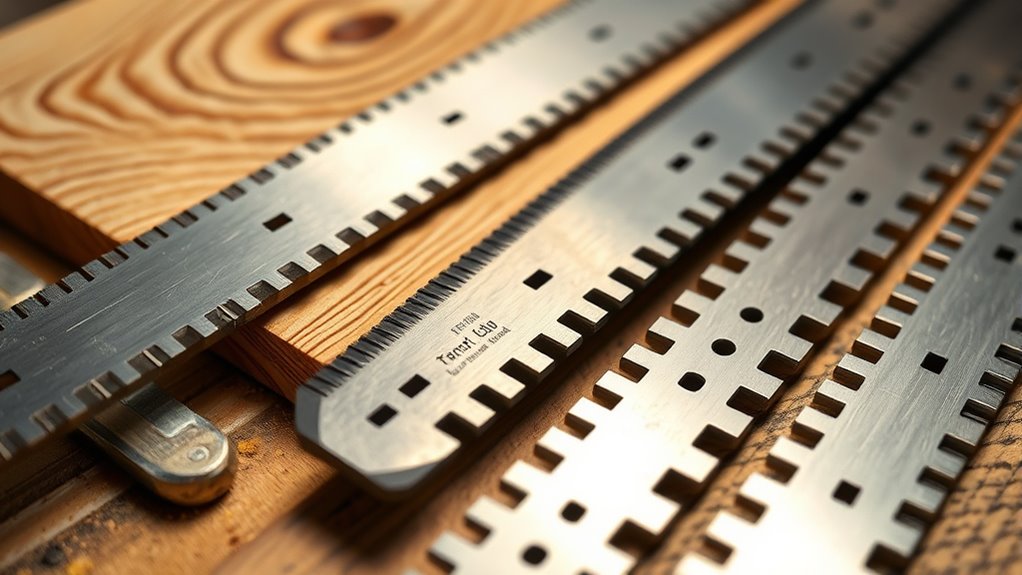
When selecting bandsaw blades for hardwood milling, I focus on several key factors to guarantee the best performance. Things like blade material quality, tooth configuration, and kerf width all impact the cut quality and blade life. Understanding these elements helps me choose the right blade for precise, durable cuts.
Blade Material Quality
Choosing the right bandsaw blade for hardwood milling hinges largely on the quality of its material. High-quality blades are crafted from premium steels like Swedish Silicon steel, high-speed M42 bi-metal, or DoubleHard alloy steel, which deliver superior durability and edge retention. Induction hardening throughout the blade ensures a consistent hardness and sharper teeth, markedly extending its lifespan. The steel composition also affects heat resistance, minimizing warping and maintaining precise cuts during long milling sessions. Using blades made from high-alloy steels with advanced manufacturing processes results in more ductile, cooler-running blades that are less prone to breakage when working with hardwoods. Investing in quality steel and proven manufacturing techniques guarantees cleaner cuts, longer service life, and reliable performance in demanding hardwood milling tasks.
Tooth Configuration Types
The tooth configuration of a bandsaw blade plays a vital role in how effectively it cuts hardwoods. Different styles, like raker, hook, and skip, are designed to optimize cutting efficiency and chip removal. Raker teeth provide a smooth, balanced cut with minimal chip buildup, making them ideal for milling dense hardwoods. Hook teeth feature a pronounced hook angle that aggressively slices through material, suitable for rough milling when speed matters. Skip teeth alternate between cutting and non-cutting teeth, reducing heat and vibration, which helps prevent overheating and extends blade life during heavy-duty work. The choice of tooth style directly affects the blade’s ability to handle hardwood density and project demands, impacting both cut quality and durability. Picking the right configuration is key to efficient, clean milling.
Kerf Width Significance
Selecting the right kerf width for a bandsaw blade is essential because it directly impacts cutting efficiency and material conservation during hardwood milling. A thinner kerf removes less wood, reducing waste and requiring less power, which is ideal for conserving material and minimizing strain on your saw. However, it may be less stable when cutting dense hardwoods, risking less accurate cuts. A wider kerf offers more stability and less blade flex, ensuring cleaner, straighter cuts in tough wood. Additionally, kerf width affects heat generation; narrower kerfs produce less heat, decreasing warping and dulling risks during extended milling. Ultimately, choosing the right kerf involves balancing cut precision, material savings, saw power, and the hardness of the hardwood you’re working with.
TPI and Cut Control
When considering TPI for bandsaw blades in hardwood milling, it’s important to understand how teeth count influences cut control. Lower TPI, like 2-3, features larger teeth that remove material quickly and are ideal for rough milling. They offer better chip clearance but less precision. Higher TPI, such as 10-14, provides finer cuts and smoother finishes, making them perfect for detailed work and finishing passes. The number of teeth affects control: fewer teeth increase chip removal but reduce accuracy, while more teeth improve control but can slow the cut. Choosing the right TPI depends on balancing cutting speed with surface quality. Matching TPI to the hardness and density of your hardwood ensures stable teeth engagement, minimizes vibration, and results in a cleaner, more controlled cut.
Hardness and Durability
Hardwood milling demands bandsaw blades that can withstand high stresses and abrasive materials, making hardness and durability critical factors in your choice. I look for blades with induction-hardened teeth, which ensure consistent hardness throughout, boosting wear resistance and longevity. High-alloy steels like Swedish Silicon Steel or M42 High-Speed Steel are my go-to materials because they handle the intense stresses of hardwood milling without dulling quickly. The tooth edge hardness, often 20% harder than high carbon steel, is essential for cutting through dense, tough wood smoothly. Durability is also improved with thicker blades and strong welds, reducing bending or snapping under heavy loads. Proper tensioning and regular sharpening help maintain this hardness, ensuring consistent performance during extended milling sessions.
Compatibility With Saws
Ensuring your bandsaw blade is compatible with your saw’s specifications is essential for safe and efficient hardwood milling. First, check that the blade’s length and width match your saw’s requirements to guarantee a proper fit and prevent accidents. Verify that the blade’s TPI and tooth design suit your cutting tasks and the type of hardwood you’re working with, as this impacts cut quality and safety. Additionally, confirm that your saw’s maximum wheel diameter and tension capacity can handle the blade’s size and tension needs without strain. It’s also important to ensure the mounting hole pattern aligns with your saw’s arbor or wheel hubs for secure installation. Always review the manufacturer’s guidelines for compatible models to avoid mismatches that could compromise performance or safety.
Cutting Speed Considerations
Selecting the right cutting speed is essential because it directly affects both the quality of your cut and the lifespan of your bandsaw blade. If you run the blade too fast, it can generate excessive heat, leading to premature dulling or damage unless the blade is designed for high-speed operation. Choosing a blade with suitable tooth geometry and hardness helps maintain efficiency at your desired speed without shortening its lifespan. Thinner kerfs and larger TPI enable faster, smoother cuts through hardwoods. Proper tension and feed rate are critical to maximize speed while keeping the blade stable and preventing wobbling. Using blades with induction-hardened teeth and durable steel alloys allows you to cut at higher speeds without losing sharpness or risking breakage.
Frequently Asked Questions
How Does Blade Tension Affect Hardwood Milling Quality?
Blade tension plays a vital role in hardwood milling quality. When I increase the tension, the blade stays straighter, reducing wobble and giving me cleaner cuts. Too little tension causes the blade to bend or wander, ruining the cut surface. I always find that proper tension, adjusted according to the hardwood’s thickness and blade type, guarantees smoother cuts and prolongs blade life. It’s necessary for precise, high-quality milling.
What Safety Precautions Are Essential When Using Bandsaw Blades?
When using bandsaw blades, safety is vital. I always wear eye and ear protection to guard against debris and noise. I make sure the blade is properly tensioned and guards are in place before starting. I keep my hands clear of the blade path and never force the wood through. Regularly inspecting the blade for damage and turning off the saw before making adjustments keeps me safe during milling.
Can Blade Speed Be Adjusted for Different Hardwood Types?
Adjusting blade speed is like tuning a musical instrument; it guarantees harmony with your hardwood. I always tailor the speed based on the wood’s density and grain. Softer woods need a slower pace, while hardwoods thrive with a bit more speed. By fine-tuning your bandsaw, you get cleaner cuts and prolong blade life. So yes, adjusting speed is essential for peak results across different hardwood types.
How Often Should Bandsaw Blades Be Replaced During Hardwood Projects?
I get asked how often to replace bandsaw blades during hardwood projects. Honestly, it depends on the blade condition and the hardness of the wood. I usually check for dullness or missing teeth after every few cuts. If I notice burning, chipping, or increased effort, I substitute the blade immediately. Regular inspection ensures smooth cuts and prevents damage, keeping my workflow efficient and safe.
What Are the Environmental Impacts of Disposing Used Bandsaw Blades?
Did you know that millions of bandsaw blades end up in landfills each year? Disposing of used blades can release hazardous metals like chromium and lead into the environment, contaminating soil and water. I always try to recycle or properly dispose of mine through metal recycling programs. Being mindful helps reduce pollution, and I encourage others to do the same to protect our planet while maintaining our woodworking passion.
Conclusion
Choosing the right bandsaw blade really can make or break your hardwood projects. After all, I’ve found that the best blade often surprises me, just like how a good coffee can turn a rough morning around. So, whether it’s the Timber Wolf’s durability or FOXBC’s versatility, I encourage you to pick what feels right—sometimes, the perfect blade finds you when you least expect it. Happy milling!
